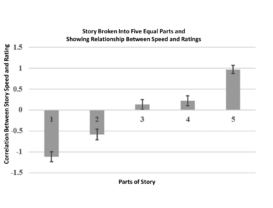I Feel the Need, The Need for Speed
Come on, I had to do it. That was a coming of age period for me, formative years and all. Plus a line that corny has to be good.
But now it’s back to our original, behavioral science fundraising channel.
Here are three story attributes that matter to success.
- Volume is bad. Does your story go from sad to happy but stop along the way at angry? More semantic stops from start to end is the volume of your story.
- Circuitousness is bad. Two stories can have the same semantic and emotional starting and end point, sad to happy, while one goes through a myriad of psychological and less inter-related states to get there and the other takes a psychologically easy glide path. The latter has traveled less mental distance and is less circuitous.
- Speed is good. How quickly does your story go from one emotion to another – e.g. sad to happy? Is your sad part in the first paragraph and your happy part in the last of a long letter? That’s slow speed.
But, the story of speed is incomplete. The nuanced bit is that starting slow but then going fast is key to quality narrative and storytelling.
There is an inherent logic to this. At the start of your storytelling the canvas is blank, the reader knows nothing of your character, setting or context. This is why descriptions of people, places and things peak at the beginning, or should – e.g. the dog in the shelter.
After that stage is set, on can refer to the dog or shelter as “it”. And while the story benefits from this slow start to set the stage and provide context, it must progress at pace to develop relationships, plot, challenges overcome and show a material change in circumstance (bad to good) and a main character with more autonomy.
Yes, completing the story is important. The “give me $20 or the dog gets it” misses so many key elements of human psychology and motivation that grading it out to explain its F-grade would take two posts. Suffice to say it’s wildly unmotivating and in fact, demotivating. Your job dear writer is to foster innate motivation, the gift that keeps on giving.
Here’s the evidence for a slow start and a fast story build. The story is chunked into five equal length parts. What’s shown is the correlation for each part and speed of story. Going fast is bad in the beginning but very good in the middle and end.

Kevin


